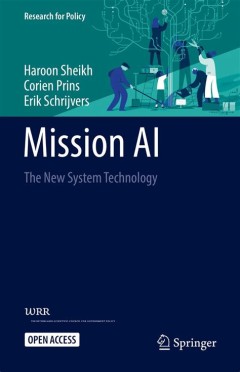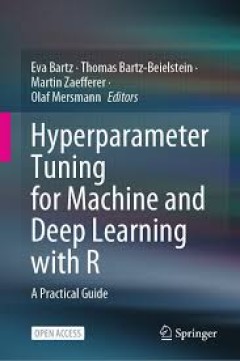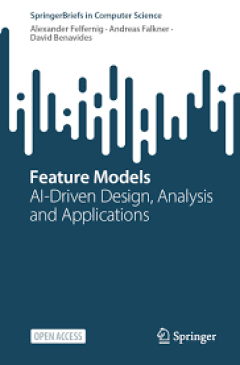Filter by

Making Presentation Math Computable
This Open-Access-book addresses the issue of translating mathematical expressions from LaTeX to the syntax of Computer Algebra Systems (CAS). Over the past decades, especially in the domain of Sciences, Technology, Engineering, and Mathematics (STEM), LaTeX has become the de-facto standard to typeset mathematical formulae in publications. Since scientists are generally required to publish their…
- Edition
- 1
- ISBN/ISSN
- -
- Collation
- XVIII, 197
- Series Title
- -
- Call Number
- XVIII, 197

Big Data and Artificial Intelligence in Digital Finance
This book has received funding from the European Union’s Horizon 2020 research and innovation programme under grant agreement No. 856632. Specifically, the chapters of the book present work and results achieved in the scope of the H2020 INFINITECH project. The editors acknowledge the contributions of all coauthors, as well as support from all INFINITECH project partners.
- Edition
- -
- ISBN/ISSN
- 9783030945909
- Collation
- XXIII, 363
- Series Title
- -
- Call Number
- -

Photonic Neural Networks with Spatiotemporal Dynamics: Paradigms of Computing…
This open access book presents an overview of recent advances in photonic neural networks with spatiotemporal dynamics. The computing and implementation paradigms presented in this book are outcomes of interdisciplinary studies by collaborative researchers from the three fields of nonlinear mathematical science, information photonics, and integrated systems engineering. This book offers novel m…
- Edition
- -
- ISBN/ISSN
- 978-981-99-5072-0
- Collation
- VIII, 278
- Series Title
- -
- Call Number
- -

Mission AI : The New System Technology
This open access book offers a strategic perspective on AI and the process of embedding it in society. After decades of research, Artificial Intelligence (AI) is now entering society at large. Due to its general purpose character, AI will change society in multiple, fundamental and unpredictable ways. Therefore, the Netherlands Scientific Council for Government Policy (WRR) characterizes AI…
- Edition
- 1
- ISBN/ISSN
- 9783031214486
- Collation
- XX, 410 hlm,: ill, lamp;
- Series Title
- -
- Call Number
- -

Robust Argumentation Machines: First International Conference, RATIO 2024, Bi…
Buku akses terbuka ini merupakan prosiding dari Konferensi Internasional Pertama tentang Mesin Argumentasi yang Kuat, Jurnal Filsafat Analitik Internasional (RATIO, International Journal of Analytic Philosophy) 2024, yang berlangsung di Bielefeld, Jerman, selama 5-7 Juni 2024. 20 makalah lengkap dan 1 makalah pendek yang disertakan dalam prosiding ditinjau dan dipilih secara saksama dari 24 kir…
- Edition
- 1
- ISBN/ISSN
- 978-3-031-63536-6
- Collation
- 1 online resource ( XVII, 372 Pages)
- Series Title
- Lecture Notes in Computer Science
- Call Number
- 006.3 CIM r

Hyperparameter Tuning for Machine and Deep Learning with R
This open access book provides a wealth of hands-on examples that illustrate how hyperparameter tuning can be applied in practice and gives deep insights into the working mechanisms of machine learning (ML) and deep learning (DL) methods. The aim of the book is to equip readers with the ability to achieve better results with significantly less time, costs, effort and resources using the methods…
- Edition
- 1
- ISBN/ISSN
- -
- Collation
- -
- Series Title
- -
- Call Number
- XVII, 323

Semantic Systems. In the Era of Knowledge Graphs; 16th International Conferen…
Buku akses terbuka ini merupakan hasil prosiding yang telah melalui proses sejawat dari Konferensi Internasional ke-16 tentang Sistem Semantik, SEMANTiCS 2020, yang diadakan di Amsterdam, Belanda, pada bulan September 2020. Konferensi ini diadakan secara virtual karena pandemi COVID-19.
- Edition
- -
- ISBN/ISSN
- 978-3-030-59833-4
- Collation
- 1 online resource (XIII, 127 Pages)
- Series Title
- -
- Call Number
- 006.3 BLO s

Advances in Intelligent Data Analysis XVIII; 18th International Symposium on …
Buku akses terbuka ini merupakan hasil dari Konferensi Internasional ke-18 tentang Analisis Data Cerdas, IDA 2020, yang diadakan di Konstanz, Jerman, pada bulan April 2020. 45 makalah lengkap yang disajikan dalam volume ini ditinjau dan dipilih dengan saksama dari 114 kiriman. Memajukan Analisis Data Cerdas memerlukan ide-ide baru yang berpotensi mengubah permainan. Misi IDA adalah untuk mempro…
- Edition
- -
- ISBN/ISSN
- 978-3-030-44584-3
- Collation
- 1 online resource (XIV, 588 Pages)
- Series Title
- -
- Call Number
- 006.3 BER a c.1

Feature Models : AI-Driven Design, Analysis and Applications
This open access book provides a basic introduction to feature modelling and analysis as well as to the integration of AI methods with feature modelling. It is intended as an introduction for researchers and practitioners who are new to the field and will also serve as a state-of-the-art reference to this audience. While focusing on the AI perspective, the book covers the topics of feature mode…
- Edition
- -
- ISBN/ISSN
- 978-3-031-61874-1
- Collation
- X, 122
- Series Title
- SpringerBriefs in Computer Science (BRIEFSCOMPUTER)
- Call Number
- 001 FEL f

Artificial Intelligence and Cognitive Science : 30th Irish Conference, AICS 2…
This open access book constitutes selected papers presented during the 30th Irish Conference on Artificial Intelligence and Cognitive Science, held in Munster, Ireland, in December 2022. The 41 presented papers were thoroughly reviewed and selected from the 102 submissions. They are organized in topical sections on machine learning, deep learning and applications; responsible and trustwo…
- Edition
- -
- ISBN/ISSN
- 978-3-031-26438-2
- Collation
- XIV, 540
- Series Title
- Communications in Computer and Information Science (CCIS, volume 1662)
- Call Number
- 001 ART
 Computer Science, Information & General Works
Computer Science, Information & General Works  Philosophy & Psychology
Philosophy & Psychology  Religion
Religion  Social Sciences
Social Sciences  Language
Language  Pure Science
Pure Science  Applied Sciences
Applied Sciences  Art & Recreation
Art & Recreation  Literature
Literature  History & Geography
History & Geography